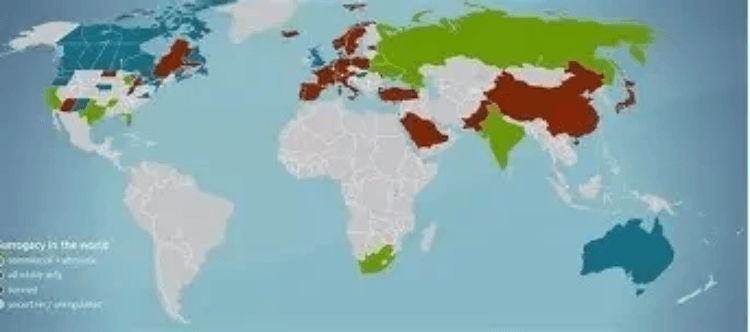
Surrogacy has long been a sensitive yet transformative component of assisted reproductive technology (ART), offering hope to individuals and couples facing infertility, medical barriers, or social obstacles to parenthood. However, in the past three years, the global regulatory environment surrounding surrogacy has undergone significant transformation. Driven by evolving social values, legal precedents, and growing awareness of ethical complexities, governments and institutions are redefining how surrogacy is governed—with a stronger focus on human rights, medical integrity, and cross-border coordination.
This article explores the most impactful recent changes in surrogacy policies across key regions, analyzes emerging regulatory trends, and discusses their implications for intended parents, surrogates, healthcare providers, and legal professionals. As search engines like Google prioritize authoritative, up-to-date, and user-focused content, understanding these developments is essential not only for those directly involved in surrogacy but also for digital platforms aiming to rank highly for relevant reproductive health and family planning queries.
A New Era of Legal Clarity and Inclusion
One of the most notable shifts in recent surrogacy policy is the expansion of eligibility beyond traditional heterosexual couples. In 2023, Spain introduced draft legislation to legalize gestational surrogacy under strict conditions, marking a potential reversal of its previous blanket ban. While the law is still under parliamentary review, early provisions include safeguards such as mandatory psychological evaluations, independent legal representation for surrogates, and restrictions limiting access to medically indicated cases. If passed, Spain could become a major European destination for regulated surrogacy, joining countries like Greece and Portugal, which have already opened their frameworks to same-sex couples and single individuals.
In Portugal, a landmark Constitutional Court decision in early 2023 struck down restrictions that previously excluded same-sex male couples from accessing surrogacy. The ruling emphasized constitutional rights to personal development and family life, setting a precedent for other nations with similar legal barriers. This judicial shift reflects a broader trend: courts increasingly stepping in to correct legislative gaps in reproductive rights, especially where laws lag behind social progress.
Meanwhile, Australia has seen continued decentralization with state-level reforms. Queensland updated its Surrogacy Act in 2024 to streamline the parentage transfer process and reduce bureaucratic delays, while Western Australia introduced financial support mechanisms to help cover surrogacy-related expenses for eligible couples. These incremental changes signal a national move toward standardization and improved accessibility, even within a federated legal system.

Stricter Regulations and the Push for Ethical Oversight
While some nations are expanding access, others are tightening regulations to prevent exploitation and ensure ethical compliance. India’s 2022 Surrogacy (Regulation) Act remains one of the most consequential policy shifts in recent years. The law bans commercial surrogacy entirely and restricts altruistic surrogacy to married Indian heterosexual couples with proven infertility. Foreign nationals, single individuals, and LGBTQ+ couples are explicitly excluded.
The rationale behind this restriction centers on protecting vulnerable women from exploitation in a previously unregulated market. However, critics argue that the policy has driven many intended parents toward riskier, unregulated channels or to seek surrogacy abroad—often in countries with weaker legal protections. This paradox underscores a global challenge: balancing ethical safeguards with equitable access.
In response, countries like Canada and the United Kingdom are reinforcing their altruistic surrogacy models with enhanced oversight. Canada updated its Assisted Human Reproduction Act guidance in 2024 to clarify allowable expense reimbursements and strengthen consent protocols. Similarly, the UK’s Human Fertilisation and Embryology Authority (HFEA) launched a public consultation in 2023 on modernizing surrogacy pathways, including proposals for a “parental order” system that would simplify post-birth legal recognition.
These developments reflect a growing consensus: surrogacy must be governed by transparency, informed consent, and robust legal frameworks—even in non-commercial settings.
Addressing Cross-Border Challenges and Citizenship Rights
One of the most complex aspects of modern surrogacy is international recognition. When a child is born via surrogacy in one country to parents from another, issues of citizenship, passport issuance, and legal parentage can create significant hurdles.
Recent policy changes aim to resolve these challenges. In Canada, Immigration, Refugees and Citizenship Canada (IRCC) issued updated guidelines in 2023 clarifying that genetic connection is sufficient for a child born via international surrogacy to acquire Canadian citizenship at birth—removing previous requirements for at least one parent to be physically present in Canada. This change aligns with evolving interpretations of family rights and reduces bureaucratic burdens on intended parents.
Similarly, the European Court of Human Rights (ECHR) has issued several rulings reinforcing the right of children born through international surrogacy to establish legal parentage and avoid statelessness. In a 2023 case involving a French same-sex couple, the court ruled that France’s refusal to recognize a foreign birth certificate violated the child’s right to private and family life under Article 8 of the European Convention on Human Rights. This decision is expected to influence national policies across the EU, encouraging greater legal harmonization.

Technological Integration and Digital Policy Frameworks
Advances in reproductive medicine and digital health are also shaping policy. The rise of telemedicine, AI-driven matching platforms, and blockchain-based consent records are prompting governments to develop new regulatory standards.
For example, Israel—a long-time leader in ART—launched a national digital surrogacy registry in 2024 to track agreements, medical records, and legal outcomes. The system enhances transparency, reduces fraud, and ensures compliance with evolving guidelines. Other countries are exploring similar digital infrastructures to monitor surrogacy programs and protect participant data.
Additionally, fertility clinics in the United States are increasingly required to report surrogacy outcomes to the CDC’s National ART Surveillance System (NASS), improving data collection and informing future policy decisions. States like California and Colorado have enacted laws mandating that surrogacy agencies disclose success rates, fee structures, and dispute resolution processes—mirroring trends in consumer protection.
The Road Ahead: Toward Global Standards?
While no universal surrogacy framework exists, recent developments suggest a convergence toward core principles: informed consent, medical safety, non-exploitation, and the best interests of the child. International organizations such as the World Health Organization (WHO) and UNESCO are beginning to advocate for global guidelines on ART, including surrogacy, to prevent “reproductive tourism” and ensure ethical consistency.
Moreover, patient advocacy groups are playing a growing role in shaping policy. Organizations like Men Having Babies and Path2Parenthood have successfully lobbied for legal reforms in multiple jurisdictions, emphasizing the need for inclusive, evidence-based legislation.

Conclusion
The past few years have marked a turning point in the evolution of surrogacy policy. From Portugal’s landmark court rulings to India’s restrictive reforms and Canada’s progressive citizenship updates, the global landscape is responding to the complex realities of modern family building. These changes are not just legal adjustments—they reflect deeper societal shifts toward inclusivity, accountability, and human dignity.
For digital platforms focused on reproductive health, covering these developments with depth, accuracy, and empathy is key to earning trust and improving search engine visibility. By producing content that addresses real user concerns—legal uncertainty, ethical risks, international travel, and emotional support—websites can position themselves as authoritative resources in a rapidly changing field.
As surrogacy continues to evolve, one principle remains constant: the need for policies that protect all parties while honoring the universal desire for family. The recent wave of regulatory change suggests we are moving, however unevenly, toward that goal.
